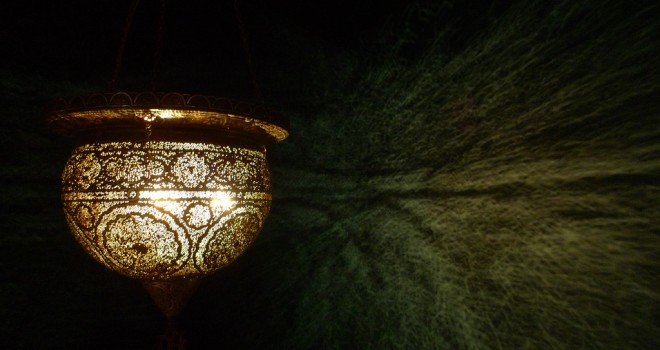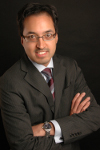
Faith in Science by Asim Siddiqui
 You wait for one step forward in Muslim thinking, then two come along at the same time. Hot on the heels of a major debate held at the University of London on Muslim understanding of evolution, the venue was to witness another, more intimate and intense, event on the very approach of Islam towards Science, organised by the American University of Sharjah, the Université Interdisciplinaire de Paris and the London-based Quilliam Foundation.
You wait for one step forward in Muslim thinking, then two come along at the same time. Hot on the heels of a major debate held at the University of London on Muslim understanding of evolution, the venue was to witness another, more intimate and intense, event on the very approach of Islam towards Science, organised by the American University of Sharjah, the Université Interdisciplinaire de Paris and the London-based Quilliam Foundation.
Speakers included leading experts in science, religion and philosophy. Participants were young budding Muslim scientists from across the world. There’s a popular notion amongst many Muslim circles that the golden age of Islam was a time when Muslims were better observant and practicing of their faith, and the subsequent decline was due to their deviation from the practice of Islam. Islam here being defined by its rituals. What is less understood is that this age of discovery and science were during periods when Muslims had the freedom to understand the natural order through the pursuit of intellectual rigour and a reasoned approach, in fact they were free to interpret the Quran (considered the word of God by Muslims) as urging believers to do just that. It was when this reasoned approach began to contradict orthodox readings of the Quran that a great internal debate ensured essentially over which should trump, reason or faith. Faith won the argument and intellectual decline soon set in. The tragedy being that science (reason) and true faith can never contradict. Any apparent contradictions were a result of human limitations in interpreting the Quran. This was how Ibn Rushd (the great Andalusian scholar known in the west as Averroes) masterly harmonised the two.
The workshop seeked to explore these themes. So for example, there are verses in the Quran that refer to the sun rising and setting, but these must be interpreted figuratively and not literally (sunrise and sunset are still terms used in the English language but no one means them literally).
Astrophysicist speaker Professor Nidhal Guessoum proposed that modern science should be approached independently from one’s religion – so Muslim science should be no different from science performed by Christian, Buddhists, western science and so on. Science is science. Ibn Rushd described science as the truth and religion as wisdom, both complementary to one another. Science will never prove or disprove God. Science is the how, religion is the why. People’s world view and ethics will and should determine the application of the science, not the science itself.
Another contentious area debated at the workshop was over the occurrence of miracles. Astronomer and theologian Dr Usama Hasan suggested it went back to how these are defined. If they be defined as a suspension of the natural order (by God) then modern science would never recognise such events. However, another way of looking at miracles was suggested: whilst God is quite capable of breaching His own rules of nature should He wish to, He has made a commitment in the Quran to not be unjust, so to intervene in favour of one individual or group and not another in a similar predicament would be unjust (which He cannot be) and simply undermine the very laws of nature He created in the first place. So ‘miracles’ can simply be defined as incidents that are unfamiliar to the people who witness them, but through the passage of scientific discovery, will be explainable. This should not be seen as taking away from the majesty of God, just an understanding of how His creation operates.
The problem is that Muslims today do not teach the stories of their great historic thinkers other than in vague terms proving how great Muslims once were. The first step would actually be to understand what they stood for and how far their thinking went and how regressed thinking is today. With regression comes intolerance. Ideas of scholars of almost a millennia ago would be considered blasphemous by many traditionalists today. So what is needed is the space to debate these ideas freely without fear of censure and to have the confidence that true religion will never clash with science. Where they apparently do, science must trump and that in turn leads to a new way of seeing the world and of interpreting the Quran in the light of new knowledge: a new, more profound understanding of the natural world, and the ‘miracles’ of God keep revealing themselves. The workshop was another small step in the right direction.
Asim Siddiqui
“Safe spaces to think critically and unconventionally are sorely needed in Muslim communities. The Muslim Institute provides one such space. As one of Britain’s oldest think tanks it is also one with the newest ideas.”
Asim is an Executive Vice President at a city investment bank. He is co-founder and former chairman of the City Circle (www.thecitycircle.com) and founding board member of Cedar. Asim has been on the front cover of TIME Magazine as part of a piece on ‘Europe’s Muslim Success Story’. He has featured in a number of books on the development of British Muslim communities including “Young, British Muslim Voices” (Greenwood World), “Young, British & Muslim” (Continuum) and “Race, Islam and Being British” (Guardian/Barrow Cadbury Trust).

